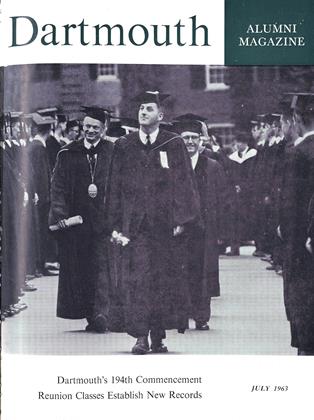By Robert Hayden Alcorn '31. New York: David McKayCo., 1962. 209 pp. $3.95.
It is highly doubtful that the complete story of the OSS will ever be told. Not only its size - starting with a handful of men in the fall of 1941 it grew to over 30,000 persons at its peak strength - but the nature of its work militates against it. The latter was or at least intended to be secret. The enemy was supposed to feel the impact of its operations and not to know of the guiding hand behind them. Congressmen had to be kept at a distance, and this was accomplished by financing all operations directly from the President's emergency fund.
Even within its own compartmentalized confines an atmosphere of strict secrecy prevailed. Operatives of one branch were never to even mention what they were up to at the moment in conversations with members of another branch. The words of General Donovan, "Of course, we're not to talk about this for at least 20 years," uttered in his usual offhand and mild manner - a manner he always assumed whenever he wanted to say something important - percolated down to the lowest levels of the organization and set the tone for its operations.
What we can expect then is that someone gifted with a long and vivid memory and the art of story-telling might come forth from time to time and tell us about some facet of that organization's wartime exploits. A few have already done so. Mr. Alcorn has now joined their ranks, and in a most commendable manner.
Situated strategically as he was (he was responsible for the whole financial operation of OSS throughout the world) and very close to the General himself, he was in a position to obtain both an overall view of the organization, and a true picture of some of the intensely suspenseful performances of its agents in the field. He describes both in a captivating style. Even the account of the establishment of OSS and its rapid expansion and evolution from a coordinating agency of intelligence to carefully planned sabotage to morale operations, which in other hands might have remained a dry exposition of unfolding organizational diversification, he succeeds in infusing with a dramatic tone by having the reader see the whole development through the inspiring personality of General Donovan. "It was the General's brain child." And there is ample, and tangible evidence that, in this case at least, the institution was but the shadow of its leader.
The individual experiences of a number of agents (from France to the Far East) - those "faceless, unnamed, unknown heroes of the loneliest kind of warfare" - are related with admirable restraint. Packed fully with suspense and drama these truly heroic deeds could easily tempt a less gifted writer to indulge in melodramatic or some flippant antics. Mr. Alcorn treats them with all the respect and seriousness they deserve, and leaves the reader with a feeling of admiration for the courage, the loyalty, and the supreme selflessness of the highly trained individuals who performed them.
These are tales that had to be told. But the greatest of them all is that of the General himself, who emerges from these pages as the man of vision, courage, and dedication that he was — "The Wizard of OSS," as the author calls him.
 View Full Issue
View Full Issue
More From This Issue
-
 Feature
FeatureThe Second Emancipation
July 1963 By THE REV. JAMES H. ROBINSON, D.D. '63 -
 Feature
FeatureHONORARY DEGREE CITATIONS
July 1963 -
 Feature
FeatureThe Alumni Council's 50th Year
July 1963 -
 Feature
FeatureThe Past Is Prologue
July 1963 By T. DONALD CUNNINGHAM '13 -
 Feature
FeatureA Record-Breaking Reunion Week
July 1963 -
 Feature
FeatureThe Honesty That Is Dartmouth
July 1963 By ALAN KENNETH PALMER '63
MICHAEL CHOUKAS '27
Books
-
 Books
BooksInfection with the Organism of Vincent
November, 1922 -
 Books
BooksA second edition, revised and enlarged
April 1931 -
 Books
BooksFURTHER CONTRIBUTIONS TO THE PRESTIGE VALUE OF PUBLIC EMPLOYMENT. L. D.
April 1933 By Charles Leonard Stone -
 Books
BooksThe Principles of Sociology
May, 1924 By John M. Mecklin -
 Books
BooksPREVENTION OF DISEASE IN THE COMMUNITY
JANUARY 1932 By K. N. Atkins -
 Books
BooksFree Will and, Human Responsibility: a Philosophical Argument.
April, 1912 By W.H.S.




